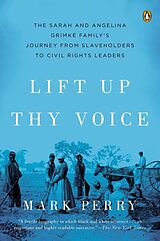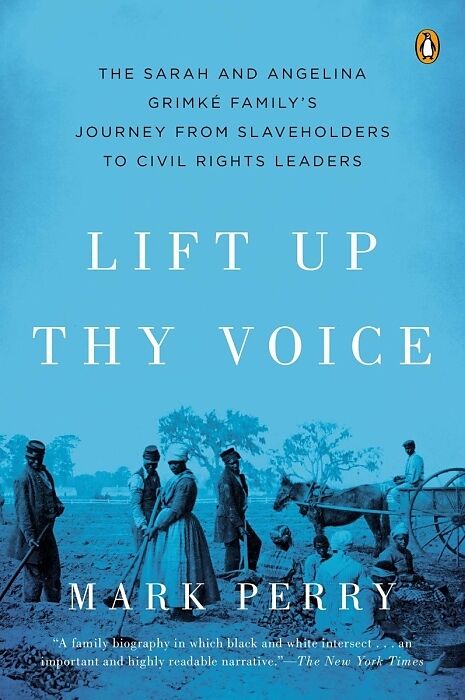Lift Up Thy Voice
Einband:
Kartonierter Einband
EAN:
9780142001035
Untertitel:
The Sarah and Angelina Grimk Family s Journey from Slaveholders to Civil Rights Leaders
Autor:
Mark Perry
Herausgeber:
Penguin Publishing Group
Anzahl Seiten:
434
Erscheinungsdatum:
31.12.2002
ISBN:
0142001031
In the late 1820s Sarah and Angelina Grimke traded their elite position as daughters of a prominent white slaveholding family in Charleston, South Carolina, for a life dedicated to abolitionism and advocacy of women's rights in the North. After the Civil War, discovering that their late brother had had children with one of his slaves, the Grimke sisters helped to educate their nephews and gave them the means to start a new life in postbellum America. The nephews, Archibald and Francis, went on to become well-known African American activists in the burgeoning civil rights movement and the founding of the NAACP. Spanning 150 eventful years, this is an inspiring tale of a remarkable family that transformed itself and America.
* “A finely rendered portrait of two Southern abolitionist and civil-rights activists, and of the time in which they lived…. More than reporting the details of the Grimké sisters’ lives and deeds, interesting enough as they are, Perry offers a learned survey of American social history in the mid-19th century, providing a vivid account of the religious revival called the Second Great Awakening and connecting the quest of their contemporaries for earthly salvation to the sisters’ thwarted determination to lead lives of religious devotion…Engaging, intelligent, and likely to be of much interest to general readers, as well as of value in courses of American history, women’s studies, and African-American studies.—Kirkus, starred review “The Grimkés’ personal struggles (the sisters’ search for religious fulfillment, the brothers’ pursuit of political satisfaction) and their published and unpublished works… hold the center to make this book eminently readable.”—Publishers Weekly“We see in [the Grimkés’] troubles our own; in their triumphs our hope; and in their history, the history of our nation.”—LIFT UP THY VOICE, Prologue
Autorentext
Mark Perry’s books include Conceived in Liberty, a main selection of the History Book Club. An award-winning writer, he has written on history, the Middle East conflict, and American foreign policy for numerous magazines and newspapers.PRAISE FOR MARK PERRY:“Mark Perry…has made their dual biography the basis for an ambitious book, a history of the North and South from before the war to the end of Reconstruction. That he succeeds so well is remarkable.”
- The New York Times Book Review“A thoughtful, moving, and wonderfully readable account of two valiant men, the war that brought them together, and the ideologies that ultimately kept them apart.”
- Cleveland Plain Dealer
Klappentext
In the late 1820s Sarah and Angelina Grimké traded their elite position as daughters of a prominent white slaveholding family in Charleston, South Carolina, for a life dedicated to abolitionism and advocacy of women's rights in the North. After the Civil War, discovering that their late brother had had children with one of his slaves, the Grimké sisters helped to educate their nephews and gave them the means to start a new life in postbellum America. The nephews, Archibald and Francis, went on to become well-known African American activists in the burgeoning civil rights movement and the founding of the NAACP. Spanning 150 eventful years, this is an inspiring tale of a remarkable family that transformed itself and America.
Zusammenfassung
In the late 1820s Sarah and Angelina Grimké traded their elite position as daughters of a prominent white slaveholding family in Charleston, South Carolina, for a life dedicated to abolitionism and advocacy of women's rights in the North. After the Civil War, discovering that their late brother had had children with one of his slaves, the Grimké sisters helped to educate their nephews and gave them the means to start a new life in postbellum America. The nephews, Archibald and Francis, went on to become well-known African American activists in the burgeoning civil rights movement and the founding of the NAACP. Spanning 150 eventful years, this is an inspiring tale of a remarkable family that transformed itself and America.
Leseprobe
Chapter One
"They shall be your bondmen for ever ..."
There was nothing outwardly ostentatious about Charleston society. To primp and preen over their wealth, to lord their position over their "lessers," or to condescend to snobbery—the province of the newly rich—would have never occurred to John Faucheraud Grimké or the other gentlemen sons of South Carolina's great families. Such behavior would have been unseemly, undignified. White Charleston society was instead a world apart, a community of wealth, custom, and privilege built on the English model. Its oldest families, who were descended from the original settlers brought to the Carolinas from Britain in 1669 under the watchful eye of Lord Proprietor Sir Anthony Ashley-Cooper, had become the denizens of a new class of cotton, indigo, and rice wealth. Endowed with such a distinguished pedigree (their ancestors had been sent to the New World by their king, Charles II, himself), they affected what they believed to be the aristocratic manner of their British cousins. Their belief in their way of life, and in their right to live that life as they pleased, formed the central tenet of their faith. Along the Ashley and Cooper rivers (which join, Charlestonians say, "to form the Atlantic Ocean"), the Pinckneys, Gaillards, Alstons, Draytons, Smiths, Laurenses, Lowndeses, Middletons, Hugers, Rutgerses, and Grimkés built homes with tall wooden doors and ornate black iron gates, behind which well-attired slaves served cool drinks or tended gardens that imitated those ofEngland's noble estates. Everything about Charleston bespoke its standing as the South's greatest city—if not in size, then in status and stature. By 1800, with a population of twenty thousand—a mere 150 years after its first one hundred families landed at the spit of land named Oyster Point—Charleston was the South's premier port and America's fourth-largest urban area. Its harbor was crowded with ships bound for Britain, France, the Northern states, and Africa. Charleston exported tobacco, rice, cotton, indigo, and lumber and imported textiles, furniture, and slaves. A visitor to Charleston in 1800 would have been impressed by the city's understated magnificence; it was as subtle and majestic as any midsize British town but without the seedy clutter. It was only a short carriage ride from the outskirts, down the tree-lined cobblestoned streets and past the homes of Charleston's most affluent citizens, to the center of the city, which was located on a flat peninsula. There, Charleston's banks, dry-goods stores, artisan shops, and law, municipal, and state offices were grouped along two dozen streets that led down to the city park, near the "battery." Young men and women, courting, strolled each summer evening along the waterfront, often accompanied by servants. There were benches in the park, set among oak, maple, and cypress trees planted by the first settlers. If laughter was heard, it was restrained; the more boisterous voices, from the docks, were muted by the long row of offices on the southern side of the city center. On the other side of the city, separated from the affluent homes by a creek, a small group of middle- and lower-class homes jutted up against the modest post office. Nearby were the slave pens, to which men, women, and children from Africa were brought after being quarantined and before being sold to the wealthy pl…

Leider konnten wir für diesen Artikel keine Preise ermitteln ...
billigbuch.ch sucht jetzt für Sie die besten Angebote ...
Die aktuellen Verkaufspreise von 6 Onlineshops werden in Realtime abgefragt.
Sie können das gewünschte Produkt anschliessend direkt beim Anbieter Ihrer Wahl bestellen.
Loading...
Die aktuellen Verkaufspreise von 6 Onlineshops werden in Realtime abgefragt.
Sie können das gewünschte Produkt anschliessend direkt beim Anbieter Ihrer Wahl bestellen.
| # | Onlineshop | Preis CHF | Versand CHF | Total CHF | ||
|---|---|---|---|---|---|---|
| 1 | Seller | 0.00 | 0.00 | 0.00 |
